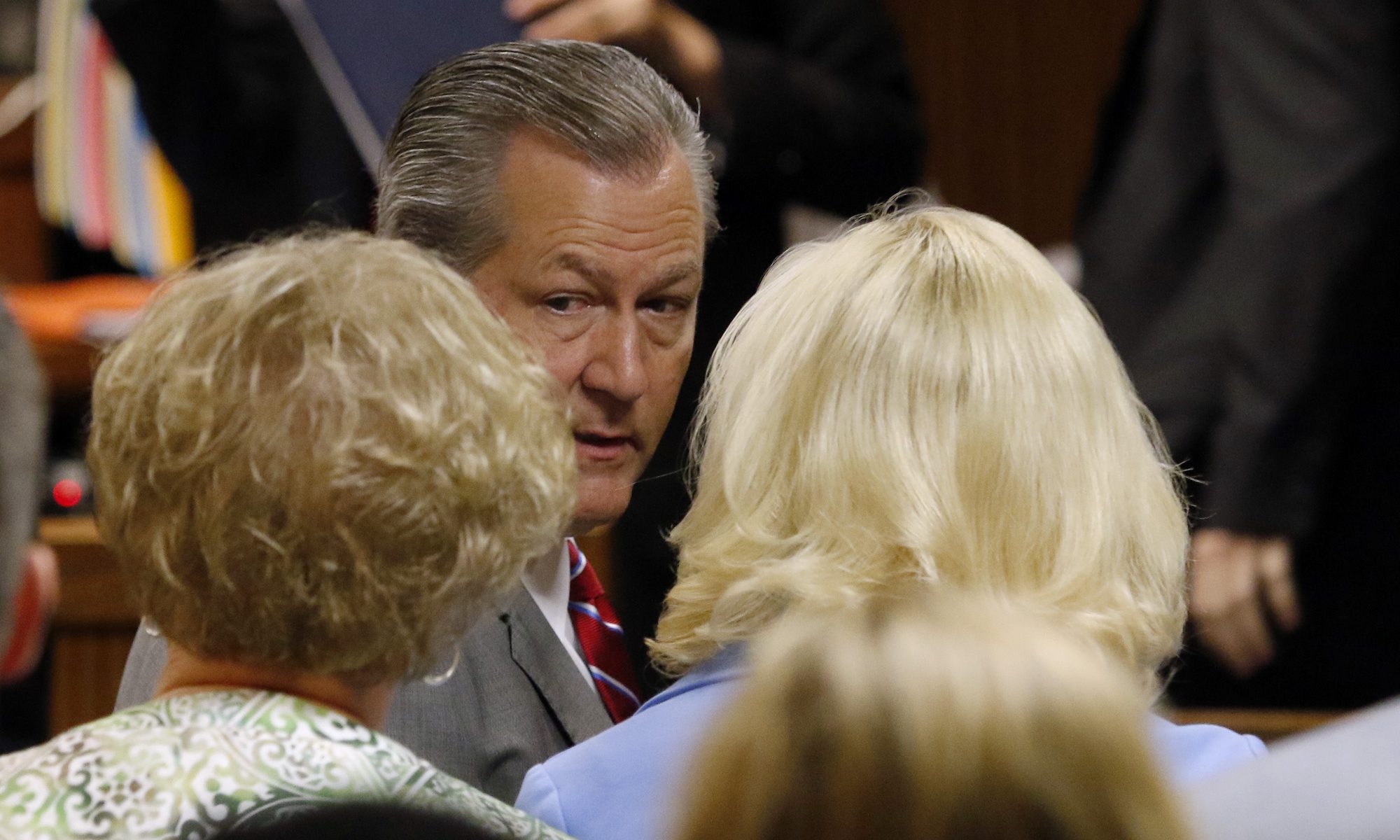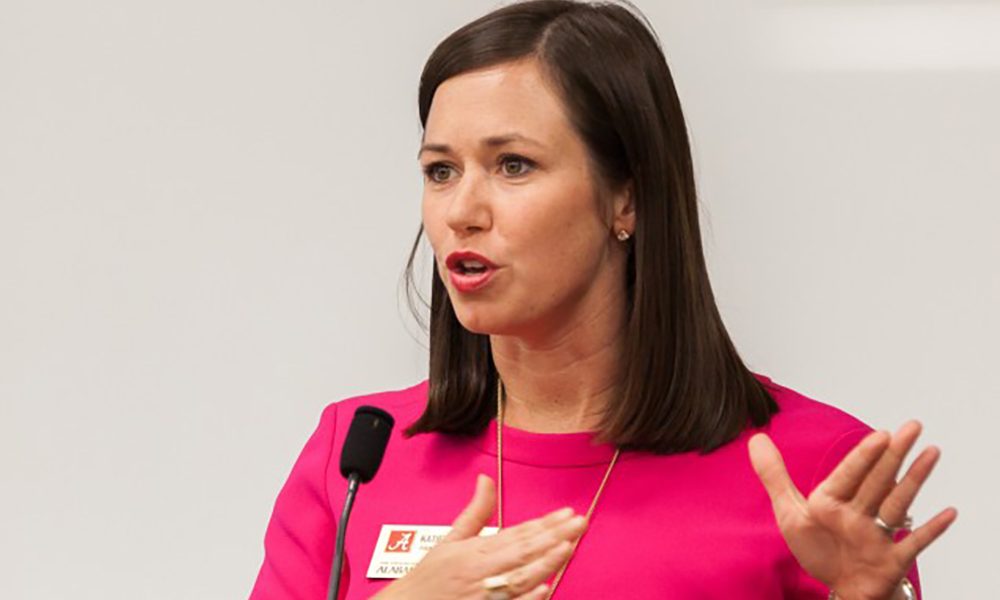9. Who will challenge Sen. Doug Jones in 2020?
It may have been only a year ago that Doug Jones won in a historic victory that sent a Democrat from Alabama to the U.S. Senate for the first time in a quarter century, but he’s up for re-election in 2020.
With that election just around the corner, a slate of Republican candidates will begin announcing their candidacies in 2019. No one is guaranteed the Republican nomination, but there are few names leading the pack. Rep. Bradley Byrne — a former gubernatorial candidate and Republican from South Alabama — has all but announced his candidacy. State Auditor Jim Zeigler, a long-shot candidate, mind you, has launched an exploratory campaign. And could former senator and attorney general Jeff Sessions run for his old seat?
These questions will likely be answered in 2019 as Republicans prepare for what could be a heated and highly contested primary in 2020.
8. Prison construction and lawsuits
The state of Alabama’s aging and dilapidated prisons have been an issue for years. Most of them were built in the 1960s and 1970s, and the existing prisons would require more than $400 million in renovations to be brought back up to standards. At the same time, they remain overcrowded despite sentencing reform, and the constitutionality of Alabama’s prisons have been routinely challenged. Federal judges have said Alabama’s prison conditions are unconstitutional, and another lawsuit remains to be decided.
Lawmakers tried twice in 2016 and 2017 to pass a billion-dollar prison construction plan pushed by Gov. Robert Bentley and ADOC Commissioner Jeff Dunn, but both attempts failed. The Department of Corrections has hinted that it may try a version of that plan again during the 2019 session. It’s also possible they could try leasing instead of building their own prisons.
Either way, the state of Alabama’s prisons will be on the agenda in 2019, and the second phase of a massive lawsuit brought by the SPLC could be on the docket next year, though no start date has been set.

Mike Hubbard looks toward his family after receiving sentencing on Friday, July 8, 2016, in Opelika, Ala.
Todd Van Emst/Opelika-Auburn News/Pool
7. The Supreme Court’s Hubbard decision
It’s been more than four years since then-House Speaker Mike Hubbard was indicted on 23 felony ethics charges in 2014. In 2016, he was convicted of 12 of those charges. Following that guilty verdict, Hubbard began appealing his conviction — a process that has been drawn out and will likely last into 2019.
Earlier this year, the Court of Criminal Appeals upheld 11 of the 12 counts, but Hubbard appealed again to the Supreme Court, which is reviewing his case. Their decision on whether to take up his case could be released in early 2019. If they take up the case, it could be months or more than a year before they reach a decision. But if they deny his appeal, Hubbard could finally begin his four-year prison sentence. He remains free on appeal bond until a final decision is made.
The Supreme Court’s decision on Hubbard’s case will have lasting implications for Alabama’s ethics laws. Though Hubbard championed them in 2010, his conviction in 2016 has led to a near all-out onslaught on the laws. A Supreme Court decision denying Hubbard’s appeal or upholding his conviction could lend some credence to the laws, which remain under scrutiny in the state Legislature.
6. Can Democrats become relevant again?
Democrats were hopeful in 2018 that they could cut into some of the Republican supermajority in state Legislature, their hold on most seats in the state’s congressional delegation and their grip on all statewide elected offices. But they failed.
Democrats weren’t able to take any Republican-held seats in Congress, and Democrats even lost seats in both chambers of the state Legislature. Democrats have less power now in Alabama than ever since the Reconstruction Era — at least outside the state’s biggest cities.
If they want to become relevant statewide again, they’ll have to find a way to win. Some Democrats, including Sen. Doug Jones, have called for new leadership of the Alabama Democratic Party. But Nancy Worley, the ADP chairwoman, and Joe Reed, the leader of the powerful Alabama Democratic Conference, have held onto their power.
It isn’t clear where Democrats go from here. If they hope to have any chance to hold onto their lone U.S. Senate seat and gain any seats in the House in 2020, they’ll have to make some changes in 2019.

5. Katie Britt takes over at BCA
The Business Council of Alabama — one of the state’s largest and most influential lobbying organizations – has a new leader, Katie Britt. Sen. Richard Shelby’s former chief of staff, Britt is expected to bring a new outlook to the organization, which fell under fire during the final few years of former president and CEO Billy Canary’s tenure.
A number of high-dollar members — from Blue Cross Blue Shield of Alabama to Alabama Power and Regions Bank — temporarily withdrew from the group because of their dissatisfaction with Canary’s leadership style. While the big players are back, Britt — the first woman to serve as the organization’s president and CEO — will face a challenge in renewing the organization’s strength and influence.
4. The Ethics Commission
The Alabama Ethics Commission has been under fire for years for lax enforcement of the state’s ethics laws. Secretary of State John Merrill and a number of others, including opinion columnists at APR and other news organizations, have criticized the commission for writing off campaign finance fines and for collapsing separate campaign finance violations into fewer charges.
On top of that, the commission is increasingly referring violations to district attorneys to prosecute. That practice — known as shopping for a DA — has come under fire because some have said the commission is picking DAs who will go easy on those accused of violating the law.
The Ethics Commission has one primary goal — to uphold the ethics laws — but it has been routinely accused, by a handful of lawmakers and journalists alike, of doing the opposite. And the members on the commission are largely unaccountable to anyone other than themselves.
As we enter 2019, it’s clear that the Ethics Commission will face more big decisions, and it doesn’t look like it’s going to get any tougher with its charge. That reality exists while lawmakers are considering a massive rewrite of the ethics laws and there appears to be no champion of strong ethics laws.
3. Attorney General Marshall
Despite winning re-election by a large margin in November, Attorney General Steve Marshall had a rough year. His primary for attorney general was toughly contested, and one of his former Republican opponents accused him of illegally taking a PAC-to-PAC transfer.
The Ethics Commission, in a 3-to-2 vote, said it had insufficient evidence to refer him for prosecution under the state ethics laws. That’s one vote short.
Marshall recently fired Matt Hart, the chief of the public corruption division in his office. Hart’s firing was met with intense criticism by some, but many lawmakers were at least privately supportive of the decision. Hart had prosecuted a number of public corruption cases involving both Republicans and Democrats.
At the same time, Marshall is leading what could be a massive re-write of the state’s ethics laws. He’s chairing the committee convened to discuss the re-write, all while under scrutiny by opponents who say he is too lax on the laws.
As we head into 2019, the scrutiny of Marshall is sure to continue as the committee drafting the ethics re-write continues its work.
2. Gov. Kay Ivey begins her first full term
Gov. Kay Ivey is one of the most popular governors in America, and she won her first full term as governor by wide margins in November. She’ll be sworn in on Jan. 14 to begin a four-year term. Ivey has largely avoided controversy during her first year and a half of being governor, but questions have loomed about her health, though she has maintained she is healthy.
During her first partial term, Ivey promised to “right the ship of state,” a promise she says she’s kept. She removed lobbyists from state boards and commissions and has championed Alabama’s improving economy.
But as she begins her first full term, she’ll face a number of obstacles. Among them, issues on this list: a gas tax, prisons and the ethics law re-write. The first year of her term could be consumed by Republican in-fighting on these issues and others.
1. Gas tax and infrastructure
As 2019 rolls around, so does the beginning of the next legislative quadrennium. The quadrennium refers to the four-year term of the Legislature. With that, comes a new freshman class of state legislators ready to get to work. First on their plate this year is assumed to be a gas tax, which some lawmakers have been calling for for years but each year it has failed to pick up the steam needed to pass.
This year looks like the year, if ever. Republican leadership of both the House and the Senate, including Senate President Pro Tem Del Marsh and Speaker Mac McCutcheon, and Gov. Kay Ivey have named the gas tax as their top priority. They say its needed to improve and add capacity to the state’s highway system and, perhaps more importantly, to replace aging bridges.
The Legislature hasn’t increased the gas tax since 1992 when a nickel was added. Proponents of the increase say the proposed 18 cent-per-gallon increase is needed to catch up as the state lagged behind in maintaining its road infrastructure.
But opponents, including the more conservative, anti-tax wings of the GOP and some Democrats, fiercely oppose the measure. Some Democrats have said the increase would be more detrimental for the working poor, who would feel more of its effects.
As the legislative session begins, expect a big battle — perhaps an up-hill one — on the gas tax.
















































